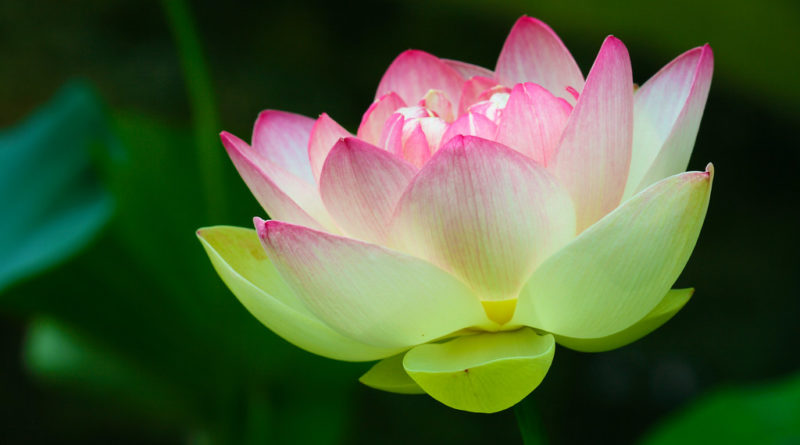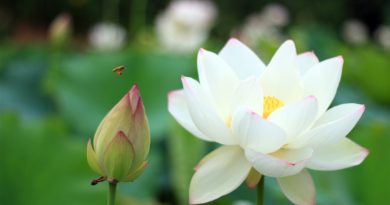Piṇḍapātapārisuddhasuttaṃ – The Purity Of Alms Food
MAJJHIMA NIKĀYA III
5. 9. Piṇḍapātapārisuddhasuttaṃ
(151) The Purity of Alms Food
I Heard thus.
At one time the Blessed One lived in the squirrels’ sanctuary in the bamboo grove in Rajagaha. Then venerable Sāriputta getting up from his seclusion in the evening approached the Blessed One, worshipped, and sat on a side. The Blessed One said to venerable Sāriputta. ‘Sāriputta, your mental faculties are bright, skin colour is pure, in which abiding, do you spend your time mostly?”
“Venerable sir, I spend my time mostly in voidance.”
“It’s good Sāriputta, you abide mostly in the abiding of Great Beings. Sāriputta, a bhikkhu who desires to abide in voidance most of the time should reflect. When going for alms along a certain path, or in a certain region, or returning along a certain path, does interest, or greed, or anger, or delusion, or aversion, arise in my mind on account of forms cognizable by eye consciousness?
When reflecting if the bhikkhu knows, when going for alms along a certain path, or in a certain region, or returning along a certain path, interest, or greed, or anger, or delusion, or aversion, arises in my mind on account of forms cognizable by eye consciousness. Then he should arouse effort to dispel those evil thoughts.
When reflecting if the bhikkhu knows, when going for alms along a certain path, or in a certain region, or returning along a certain path, interest, or greed, or anger, or delusion, or aversion, does not arise in my mind on account of forms cognizable by eye consciousness. Then he should abide joyful and happy training in those thoughts day and night.
Again Sāriputta, when reflecting if the bhikkhu knows, when going for alms along a certain path, or in a certain region, or returning along a certain path, interest, or greed, or anger, or delusion, or aversion, does not arise in my mind on account of sounds cognizable by ear-consciousness, … re … on account of scents cognizable by nose-consciousness, … re … on account of tastes cognizable by tongue-consciousness, … re … on account of touches cognizable by body consciousness, … re … on account of thoughts cognizable by mind-consciousness. He should abide joyful and happy training in those thoughts day and night.
When reflecting if the bhikkhu knows, when going for alms along a certain path, or in a certain region, or returning along a certain path, interest, or greed, or anger, or delusion, or aversion, does not arise in my mind on account of thoughts cognizable by mind-consciousness. He should abide joyful and happy training in those thoughts day and night.
Again Sāriputta the bhikkhu should reflect are my five strands of sensuality dispelled? When reflecting if the bhikkhu knows, my five strands of sensuality are not dispelled he should arouse effort to dispel the five strands of sensuality.
When reflecting if the bhikkhu knows, my five strands of sensuality are dispelled, he should abide joyful and happy training in those thoughts day and night.
Again Sāriputta, the bhikkhu should reflect are the five hindrances dispelled in me? When reflecting if the bhikkhu knows, the five hindrances are not dispelled in me he should arouse effort to dispel the five hindrances. When reflecting if the bhikkhu knows, the five hindrances are dispelled in me he should abide joyful and happy training in those thoughts day and night.
Again Sāriputta, the bhikkhu should reflect are the five holding masses accurately understood by me? When reflecting if the bhikkhu knows, the five holding masses are not accurately understood, he should arouse effort to understand the five holding masses accurately. When reflecting if the bhikkhu knows the five holding masses are accurately understood by me. He should abide joyful and happy training in those thoughts day and night.
Again Sāriputta, the bhikkhu should reflect are the four establishments of mindfulness developed in me? When reflecting if the bhikkhu knows the four establishments of mindfulness are not developed in me, he should arouse effort to develop the four establishments of mindfulness. When reflecting if the bhikkhu knows the four establishments of mindfulness are developed in me, he should abide joyful and happy training in those thoughts day and night.
Again Sāriputta, the bhikkhu should reflect are the four right efforts developed in me? When reflecting if the bhikkhu knows the four right efforts are not developed in me, he should arouse effort to develop the four right efforts. When reflecting if the bhikkhu knows the four right efforts are developed in me, he should abide joyful and happy training in those thoughts day and night.
Again Sāriputta, the bhikkhu should reflect are the four supernormal powers developed in me? When reflecting if the bhikkhu knows the four supernormal powers are not developed in me, he should arouse effort to develop the four supernormal powers. When reflecting if the bhikkhu knows the four supernormal powers are developed in me, he should abide joyful and happy training in those thoughts day and night.
Again Sāriputta, the bhikkhu should reflect are the five mental faculties developed in me? When reflecting if the bhikkhu knows the five mental faculties are not developed in me, he should arouse effort to develop the five mental faculties. When reflecting if the bhikkhu knows the five mental faculties are developed in me, he should abide joyful and happy training in those thoughts day and night.
Again Sāriputta, the bhikkhu should reflect are the five powers developed in me? When reflecting if the bhikkhu knows the five powers are not developed in me, he should arouse effort to develop the five powers When reflecting if the bhikkhu knows the five powers are developed in me, he should abide joyful and happy training in those thoughts day and night.
Again Sāriputta, the bhikkhu should reflect are the seven enlightenment factors developed in me? When reflecting if the bhikkhu knows the seven enlightenment factors are not developed in me, he should arouse effort to develop the seven enlightenment factors. When reflecting if the bhikkhu knows the seven enlightenment factors are developed in me, he should abide joyful and happy training in those thoughts day and night.
Again Sāriputta, the bhikkhu should reflect is the noble Eightfold path developed in me? When reflecting if the bhikkhu knows the noble Eightfold path is not developed in me, he should arouse effort to develop the noble Eightfold path. When reflecting if the bhikkhu knows the noble Eightfold path is developed in me, he should abide joyful and happy training in those thoughts day and night.
Again Sāriputta, the bhikkhu should reflect is my calm and insight developed?*1) When reflecting if the bhikkhu knows my calm and insight is not developed, he should arouse effort to develop calm and insight When reflecting if the bhikkhu knows calm and insight is developed, he should abide joyful and happy training in those thoughts day and night.
Again Sāriputta, the bhikkhu should reflect is science and release realized by me*2)? When reflecting if the bhikkhu knows, science and release of mind, is not realized by me, he should arouse effort to develop science and release of mind. When reflecting if the bhikkhu knows, science and release of mind, is realized he should abide joyful and happy training in those thoughts day and night.
Sāriputta, whoever recluse or brahmin purified alms food in the past, did so reflecting in this manner. Whoever recluse or brahmin would purify alms food in the future, will do so reflecting in this manner. Whoever recluse or brahmin purifies alms food at present, do so reflecting in this manner. Sāriputta, you should train in this manner.
The Blessed One said thus and venerable Sāriputta delighted in the words of the Blessed One.
[1] Is my calm and insight developed? (Bhāvitā nu kho me samatho ca vipassanā cāti?) To develop calm is to pacify the mind by throwing out evil things of demerit in the mind and not leaving any room for them to rise again. To do this there are various methods to adopt and various signs to develop. The most suitable sign should be adopted at the relevant time. A few of them are reflecting in and out breaths, being aware of one’s movements, being mindful of one’s feelings, being mindful of one’s mental states and thoughts etc. To develop insight is to be aware of the fact that everything is impermanent. That whatever impermanent thing, is unpleasant. And whatever impermanent, unpleasant thing lacks self.
[2] Is science and release realized by me? (Sacchikatā nu kho me vijjā ca vimutti cāti?) Science is the knowledge of the Truth of unpleasantness, the truth of its arising, the truth of its cessation and the truth of the path leading to the cessation of unpleasantness. When this is realized the mind is released.







